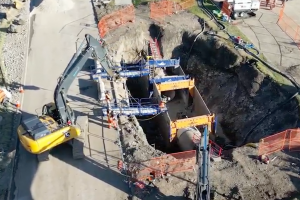In Missouri, they’re calling it the Road to Tomorrow. At least that’s what the state’s transportation department (MoDOT) is calling it. To everyone else it’s Interstate 70 between Kansas City and St. Louis. But whatever you call it, the road is about to become a "laboratory for construction of the next generation of highways" where private-sector organizations can test new technologies.
The project had been talked about for some time, but it was made official at the June meeting of the state’s Highways and Transportation Commission. It’s expected that organizations from other states will take advantage of the chance to use the highway to test new technologies. Other countries might also use the road.
A team of six MoDOT employees has been seconded to the project. At the moment, the team is still evaluating proposals for pilot projects. Some of them sound exciting. For example, it’s expected that one of the early pilots will be truck platooning.
Platooning involves wireless communication between commercial trucks so that the second truck can follow much more closely than would normally be considered safe. When bicycle racers follow closely, they’re said to be "drafting," which means they can keep pace using less energy as long as they follow closely enough. A somewhat similar system was tested in Europe several years ago with mixed success. As far as I know, though, it never went beyond the pilot stage.
The Internet of Things (IOT) might be coming to the highway as well. The IOT allows for connecting devices and vehicles using electronic sensors and the Internet. The technology can be used for such things as smart traffic control, safety and road assistance.
A request for proposals is also being prepared to install "smart pavement" for testing somewhere along the highway. Smart pavement would feature sensors and systems that provide, enable and support communication between vehicles and a variety of services. The object of smart pavement is to provide, by subscription, a suite of digital, communication and information services to the MoDOT, motor carriers and other commercial fleet operators and private drivers to enable sustainable, self-funded infrastructure assets for public owners.
Another early pilot project will investigate solar roadways. For a start, solar panels will be installed on sidewalks at a rest stop. Officials want to test their potential for generating heat to melt snow and for generation of electricity for other purposes.
The idea of solar roadways is not new. A small start-up in the northwestern U.S. has been promoting the idea for several years, but with little success. The firm even raised money for its work using one of the crowdfunding websites.
The MoDOT appears to be going the same route. It says it will allocate $100,000 in seed money to install the solar panels and use crowdfunding both to recover the seed money and expand the scope of the project if it is successful. At a time when every state, provincial and municipal government in North America is wrestling with how to fund infrastructure renewal, efforts must be focused not only on new technologies, but on new means of funding transportation.
The folks at the MoDOT talk of "subscription-based" systems, but have little to say about just what that would entail, or how they would work.
But the organization has already completed a federal grant application from a fund called Surface Transportation System Funding Alternatives. The objective would be to examine new, sustainable funding sources.
The United States already has a fairly extensive system of toll roads. In Canada? Not so much.
Most Canadian drivers get their hackles up at the very mention of toll roads. And they hate gasoline taxes. We should be watching to see what’s happening in Missouri, to see if they find a sustainable way to fund highway improvements that doesn’t involve more — and higher — tolls and/or gasoline taxes.
Korky Koroluk is an Ottawa-based freelance writer. Send comments to editor@journalofcommerce.com.










Recent Comments
comments for this post are closed